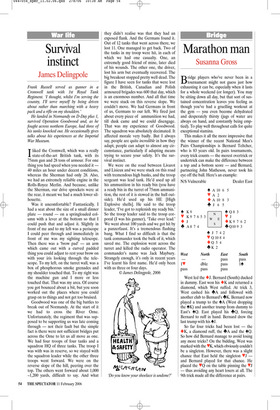Survival instinct
James Delingpole
Frank Russell served as gunner in a Cromwell tank with 1st Royal Tank Regiment. ‘I thought, whilst I’m serving the country, I’ll serve myself by being driven about rather than marching with a heavy pack and a rifle on my shoulders.’ He landed in Normandy on D-Day plus 1, survived Operation Goodwood and, as he fought across northern Europe, had three of his tanks knocked out. He occasionally gives talks about his experiences at the Imperial War Museum.
Iliked the Cromwell, which was a really state-of-the-art British tank, with its 75mm gun and 28 tons of armour. For one thing you had speed when you needed it 40 miles an hour under decent conditions, whereas the Sherman had only 28. Also, we had an extremely reliable engine in the Rolls-Royce Merlin. And because, unlike the Sherman, our drive sprockets were at the rear, it meant we had a much lower silhouette.
Was it uncomfortable? Fantastically. I had a seat about the size of a small dinner plate — round — on a springloaded column with a lever at the bottom so that I could push that and adjust it. Slightly in front of me and to my left was a periscope I could peer through and immediately in front of me was my sighting telescope. Then there was a ‘brow pad’ — an arm which came out with a curved padded thing you could adjust to rest your brow on with your iris looking through the telescope. To my left, on the turret wall, was a box of phosphorous smoke grenades and my shoulder touched that. To my right was the machine gun and I more or less touched that. That was my area. Of course you got bounced about a bit, but you soon worked out the places where you could grasp on to things and not get too bruised.
Goodwood was one of the big battles to break out of Normandy. At the start of it we had to cross the River Orne. Unfortunately, the regiment that was supposed to be supporting us was late coming through — not their fault but the simple fact is there were not sufficient bridges put across the Orne to let us all move as one. We had four troops of four tanks and a squadron HQ of three tanks. The troop I was with was in reserve, so we stayed with the squadron leader while the other three troops went forward. We were on the reverse slope of the hill, peering over the top. The others went forward about 1,000 –1,200 yards, difficult to say. And what they didn’t realise was that they had an exposed flank. And the Germans found it. Out of 12 tanks that went across there, we lost 11. One managed to get back. Two of the tanks in my troop were hit, in each of which we had one casualty. One, an extremely good friend of mine, later died of his wounds. The other one, the driver, lost his arm but eventually recovered. The big breakout stopped pretty well dead. The figure I have seen for tanks that were lost in the British, Canadian and Polish armoured brigades was 600 that day, which is an enormous number. And all that time we were stuck on this reverse slope. We couldn’t move. We had Germans in front of us, Germans to our left. We fired just about every piece of ammunition we had, till dusk came and we could disengage. That was my experience of Goodwood. The squadron was absolutely decimated. It affected morale very badly. But I always say, people are quite incredible in how they adapt, people can adapt to almost any circumstance, particularly if adapting means trying to secure your safety. It’s the survival instinct.
We were on the road between Livarot and Lisieux and we were stuck on this road with tremendous high banks, and the troop sergeant was lead tank. He’d used up all his ammunition in his ready bin (you have a ready bin in the turret of 75mm ammunition, the rest of it is stowed in the hull outside). He’d used up his HE [High Explosive shells]. He said to the troop leader, ‘I’ve got to replenish my ready bin.’ So the troop leader said to the troop corporal (I was his gunner), ‘Take over lead.’ We went about 100 yards and we got hit by a panzerfaust. It’s a tremendous flashing bang. What I find so difficult is that the tank commander took the bulk of it, which saved me. The explosion went across the turret and killed the radio operator. The commander’s name was Jack Maybury. Strangely enough, it’s only in recent years I’ve learnt his first name. He’d only been with us three or four days.














































 Previous page
Previous page